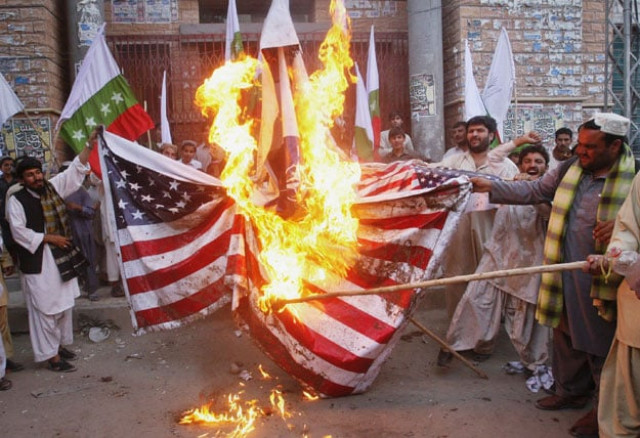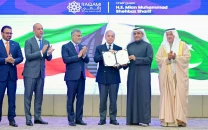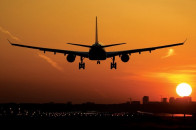Is anti-American sentiment on the decline in Pakistan?
Observers suggest negative perceptions towards US decline as Pakistanis find solutions to internal problems

In this file photo, demonstrators burn American flags as they protest against US. PHOTO: REUTERS
The decline in the number of Pakistanis who hold negative views of the United States comes as they look closer to home for the causes of — and answers to — the country’s woes, according to interviews with residents, analysts, and current and former diplomats.
Doug Chabot, who runs a charity for girls education in Pakistan, said there was no anti-American sentiment walking into stores or the markets and, if anything, people were concerned that I thought they hated Americans.
Read: On Pakistani anti-Americanism
One of the reason behind the change, cited by observers is the middle class in the country is now more supportive of American drone strikes, which have shrunk considerably since the Peshawar attack that killed over 140 students and teachers.
Moreover, as conflict spreads in the Middle East, Pakistanis are recognising that sectarian violence in Muslim countries is not driven completely by the United States. Analysts suggest that the Obama administration’s efforts to quietly rebuild relationships is having an effect.
Former Pakistan Muslim League–Nawaz Member of the National Assembly (MNA) Ayaz Amir says that the usual firebrands coming up with standard anti-American declarations are not seen anymore.
“There is a sense we have to deal with our own problems, and it is up to us how we handle those problems, and I think anti-Americanism, really, no longer seems that relevant,” Amir added.
Furthermore, a Pew Research Center poll released in August last year showed a decline in the percentage of Pakistanis who held negative views of the United States — still a majority at 59%, but down from 80% two years before.
Read: Islamic State leaflets found at shooting site of 'US national' in Karachi
Pakistan Ulema Council chairperson Allama Tahir Ashrafi said it is no more just hate heaped upon the United States.
“Because of the serious internal issues that Pakistani society is facing, and also the Muslim world is facing, the focus is not that much on the United States,” he said.
Human Rights activist Farzana Bari said the progressive Pakistanis are also choosing to stay quiet now.
"I personally have been very anti-drone strikes . . . but now I feel like, Okay, if they are dealing with the extremist groups, that is good," she added.
However, shifting attitudes do not necessarily imply that Pakistan is safe for people from the West. Just recently, an American national was shot in Karachi.
But incidents, carried out by religious extremists or criminal gangs, cloud what otherwise has been an improving relationship between Pakistan and the United States.
Yet, university students asserted that the United States is not a major topic of class discussion anymore.
“Now, it’s more of a focus on Pakistan’s internal issues, such as terrorism, an ailing economy, jobs and unemployment,” said Syed M Abdullah, 23. “It’s been a year and a half since there’s been a protest here about the drone strikes.”
Political analyst Rasul Bakhsh Rais said the rise of the Islamic State and sectarian conflict in the Middle East is diverting attention away from the United States.
Even though many Pakistanis still disdain US military involvement in the region, Rais said they increasingly pin much of the blame on “new actors” such as Iran or Saudi Arabia.
This article originally appeared on The Washington Post.



















COMMENTS
Comments are moderated and generally will be posted if they are on-topic and not abusive.
For more information, please see our Comments FAQ